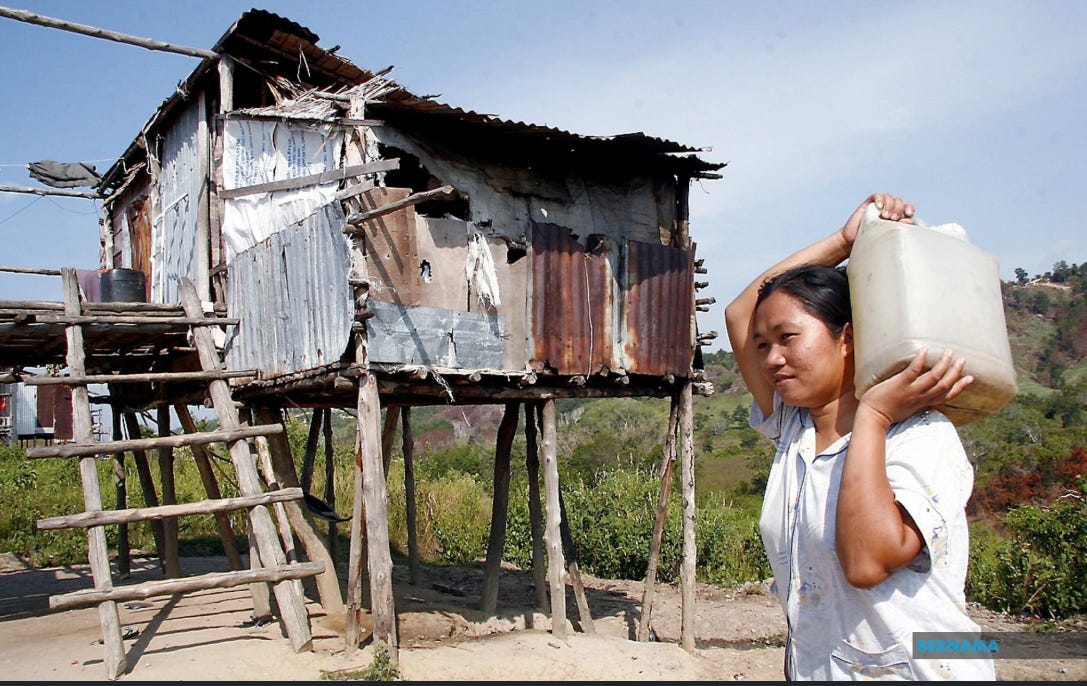
Murray Hunter
Sabah’s Economy: No Amount of Polished Narratives Can Hide the Reality
Daniel John Jambun
Aug 02, 2025

PRESS STATEMENT
2 August 2025 | Kota Kinabalu
We take note of the recent article titled “A Balanced Perspective on Sabah's Economic Performance: Countering Misleading Narratives” authored by Ramli Amir, former President of the Chartered Institute of Logistics and Transportation Malaysia.
While the article is dressed in the language of economic analysis, it is unmistakably a politically convenient narrative intended to defend the GRS-led state administration ahead of the coming state election. It attempts to reframe Sabah’s prolonged economic stagnation as a story of “resilience” and “transformation.”
Let us be clear: GDP figures and investment pledges mean nothing if they do not translate into improved living standards, better infrastructure, and meaningful autonomy over our economic future.
1. A Record GDP That Means Little for Ordinary Sabahans
Yes, Sabah’s GDP touched RM84.3 billion in 2024 — but this means little when:
Sabah still has the highest poverty rate in Malaysia, with rural communities lacking access to clean water, electricity, and proper roads.
Youth unemployment and underemployment remain chronic, forcing thousands to migrate for basic survival.
GDP per capita has declined to RM31,147 — among the lowest in the country.
What kind of “resilience” is this, when most Sabahans are still left out of the economic equation?
2. GDP Growth of 1.1% Is a Red Flag, Not a Victory
Sabah’s 1.1% GDP growth is the second-worst in Malaysia. To spin this as an achievement is an insult to the intelligence of Sabahans.
This is not “contextual sectoral adjustment” — it is a symptom of a stagnant, extractive economy with no structural reform in sight. Sarawak, in comparison, achieved higher growth by asserting stronger autonomy and pursuing clear development direction.
3. Unemployment Rate of 7.7%: Still the Worst in the Nation
Let us stop normalising failure.
The article claims Sabah’s 7.7% unemployment rate is “stable.” But it has consistently been the highest in Malaysia — more than double the national average since 2020.
This isn’t stability — it’s a long-running crisis.
4. Investment Figures Are Meaningless Without Transparency
Sabah may have “approved” RM10.9 billion in investments, but:
How much of it has actually been realised and benefitted local Sabahans?
How many real jobs have been created — or are we still seeing Peninsular cronies dominate the implementation?
Where is the public accountability for mega-projects like the RM31 billion Esteel “green steel” plant?
Without transparency, these figures are not development — they are optics without substance.
5. Tourism is Recovering — But Who Reaps the Rewards?
Tourist arrivals have increased, yes — but:
Who controls the hotels, the tourism agencies, and the flights?
Sabahans remain sidelined in the tourism value chain.
Without policies that empower local entrepreneurs, this recovery serves only a privileged few — not the wider rakyat.
6. Federal Support Is Not Generosity — It’s a Constitutional Right
Ramli Amir praises the RM6.7 billion federal allocation and “special grants” as signs of commitment. But let us not be misled:
Sabah is constitutionally entitled to 40% of net federal revenue collected from the state under Articles 112C and 112D — a right that remains unfulfilled.
These allocations do not compensate for Sabah’s continued lack of control over oil, gas, minerals, and taxation.
We don’t want token gestures. We demand our constitutional and historical rights.
7. Selective Framing Cannot Conceal Systemic Decay
The article carefully avoids mentioning:
The RM3.3 billion water corruption scandal.
Questionable mineral exploration licences awarded without transparency or public consultation.
The sabotaged 100-year timberland concessions linked to insider political deals.
A GRS administration increasingly dependent on Kuala Lumpur for survival, lacking both vision and autonomy.
A handful of positive headlines cannot erase the governance rot and economic mismanagement at the heart of Sabah’s leadership today.
Conclusion: Sabah Needs Economic Justice — Not PR Spin
No amount of “balanced narratives” by retired officials can distract from the fact that Sabah remains structurally poor, politically subservient, and economically sidelined.
Sabah must:
Reclaim full control over its natural resources and economic direction.
Implement deep structural reforms to empower local industries and entrepreneurs.
Enforce MA63 in full, including the return of our 40% revenue entitlement.
Break the cycle of dependence on federal handouts and political patronage.
What Sabah needs is not another polished defence of a failed administration — but bold leadership that dares to confront the truth and fight for the future our people deserve.
Daniel John Jambun
Presiden
Borneo's Plight in Malaysia Foundation (BoPiMaFo)
dan Change Advocate Movement Sabah (CAMOS)
No comments:
Post a Comment